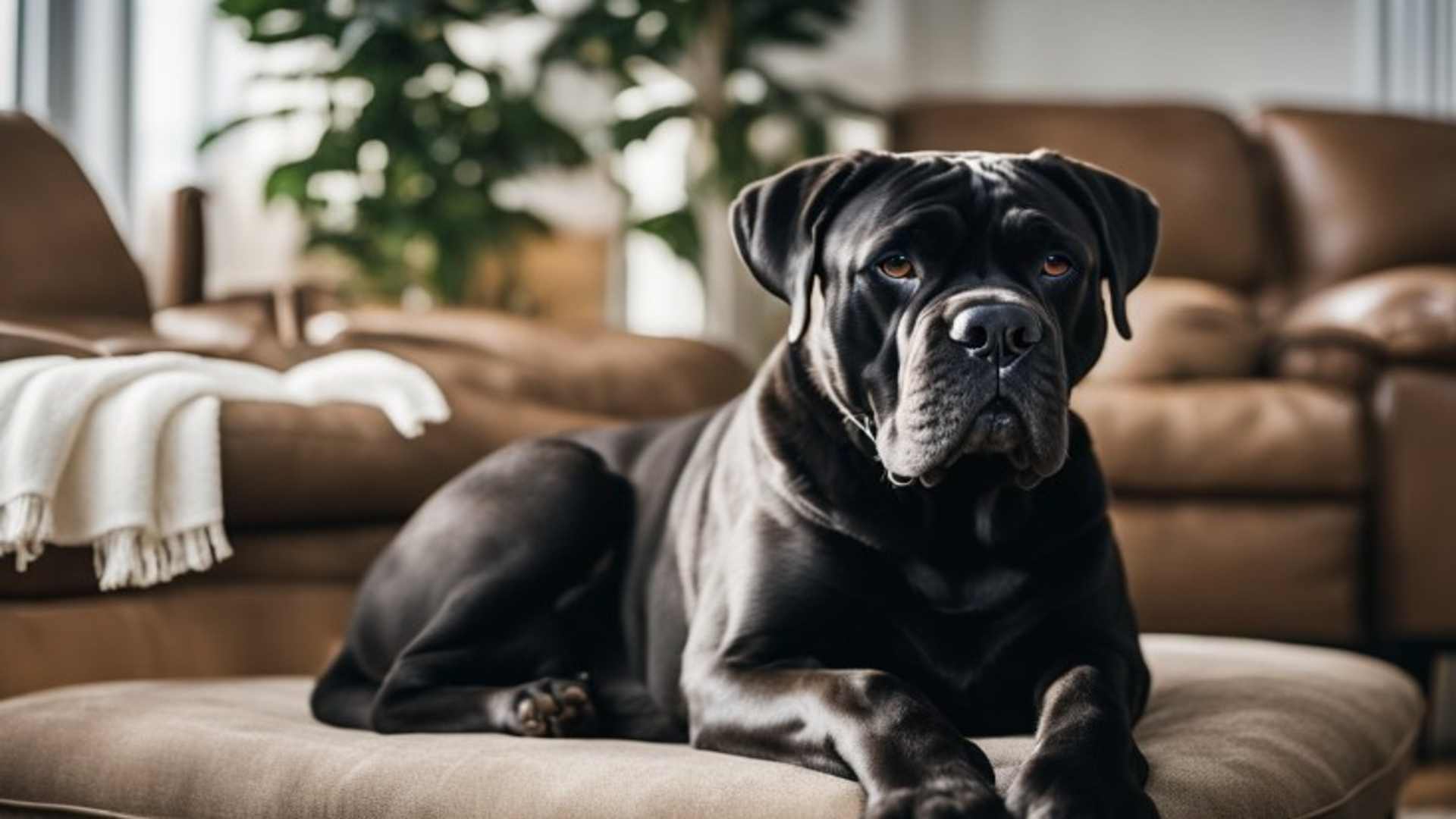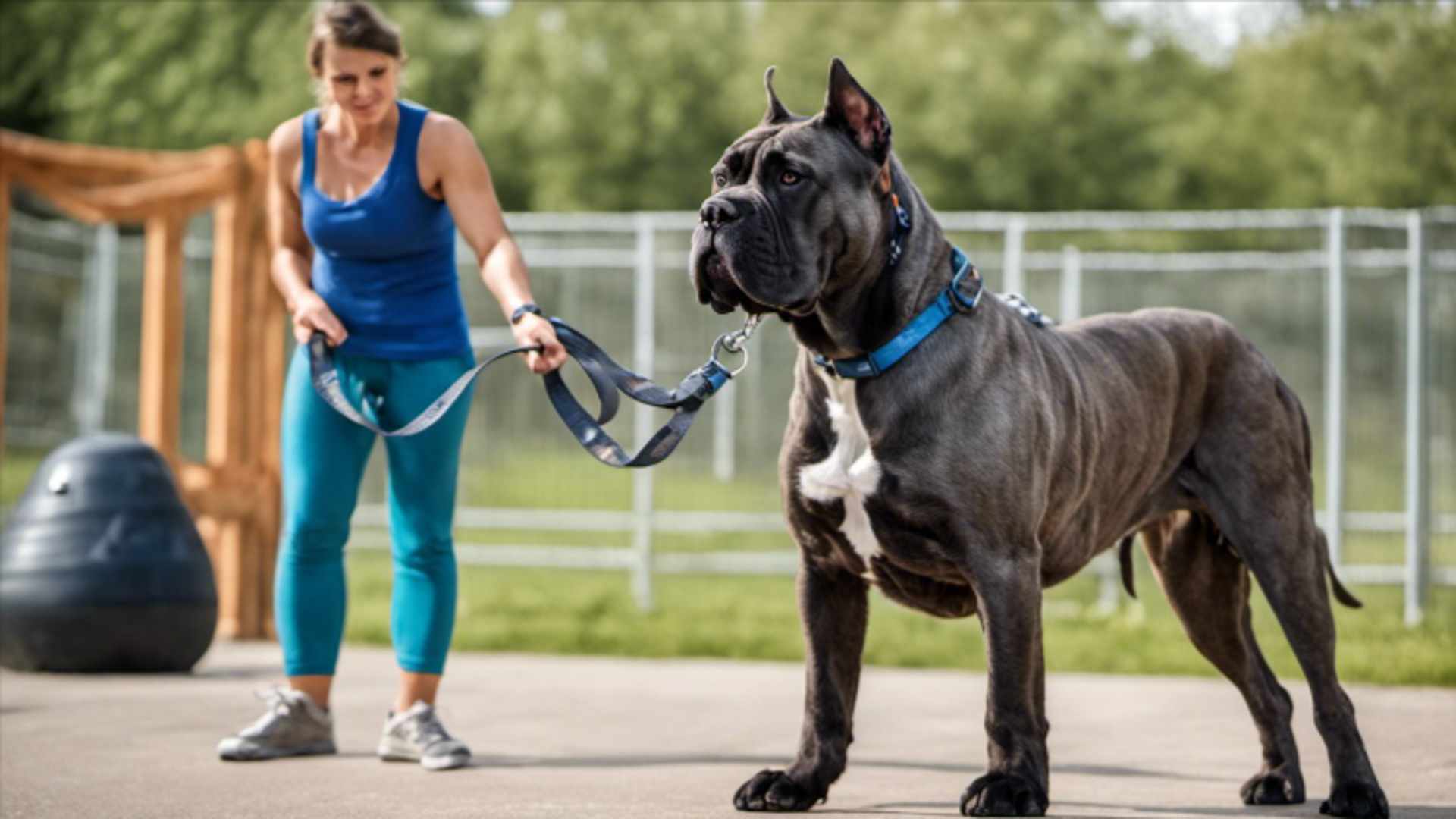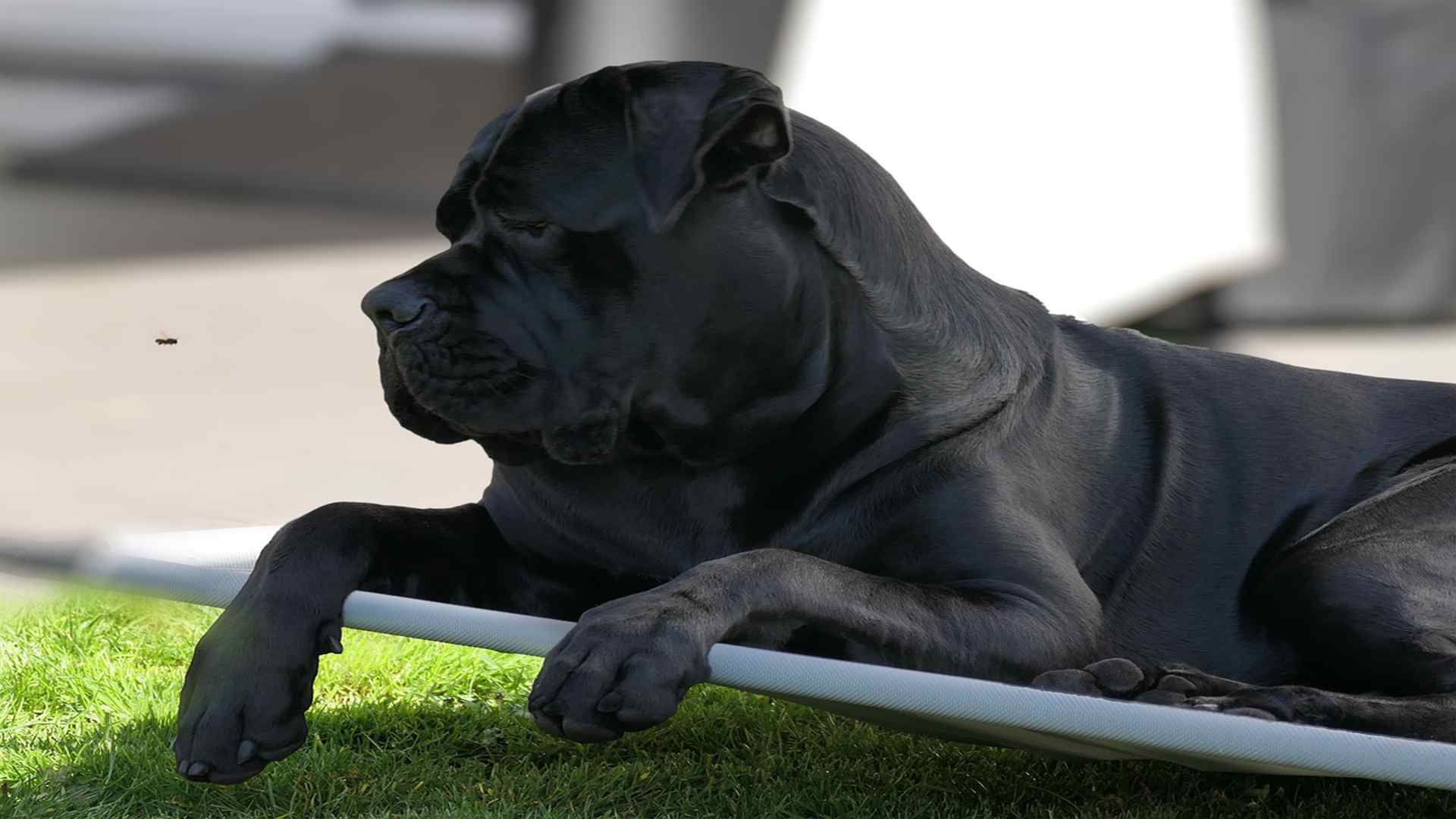Training a cane corso puppy to stop biting is essential to raising a well-behaved and gentle companion.
These powerful dogs are known for their loyal and protective nature, but if not trained properly, their biting behavior can become a problem for owners and others around them.
It is important to begin teaching a cane corso pup early to ensure that they develop appropriate bite inhibition.
In this article, we’ll provide clear and informative guidance on how to prevent and manage this behavior, ensuring that your cane corso grows up to be a loving and sociable member of your family.
Ready? If so, let’s get started!
Training a cane corso puppy not to bite
When it comes to training a Cane Corso puppy not to bite, consistency and patience are key. It is important to start early and establish clear boundaries. Redirecting the puppy’s attention to appropriate chew toys and rewarding good behavior can be effective methods.
Additionally, socialization with other dogs and people can help reduce the puppy’s urge to bite. Teaching the puppy “gentle” commands and using positive reinforcement techniques can also contribute to successful training.
When do cane corso puppies stop biting
When do Cane Corso puppies stop biting? It is a common question for new owners of this breed. Cane Corso puppies typically start to show a decrease in biting behavior as they mature and reach around 6 to 8 months of age.
This is a natural part of their development as they grow out of their puppy phase. However, it is important to start training and socializing your Cane Corso puppy from a young age to discourage biting behavior and teach them appropriate ways to interact with people and other animals.
How to train a cane corso puppy
Training a Cane Corso puppy is essential to ensure they grow up to be well-behaved and obedient dogs.
One of the common challenges that many Cane Corso owners face is dealing with biting behavior.
Start by teaching your puppy basic commands such as “sit,” “stay,” and “leave it.” These commands will form the foundation for teaching your puppy good behavior. To address biting behavior, it’s important to understand why puppies bite. Puppies often bite as a way to explore the world around them or as a form of play. When your Cane Corso puppy bites, it’s crucial to react calmly and firmly.
Avoid shouting or hitting your puppy, as this can lead to fear and aggression. One effective way to train a Cane Corso puppy to stop biting is through redirection. Whenever your puppy bites, redirect their attention to a chew toy or a treat. This helps teach your puppy what is acceptable to chew on.
Consistent training and positive reinforcement are key when teaching a Cane Corso puppy to stop biting. Remember to be patient and understanding, as training a
Understanding Cane Corso’s puppy behavior
The Cane Corso is a highly intelligent and hardworking breed, so it is essential to understand their natural behaviors when it comes to training.
Teething process
Cane Corso puppies begin teething between three to four months of age and continue until they are about seven to eight months old. When they are teething, they tend to chew on anything in sight to relieve the discomfort.
Providing appropriate chew toys and redirecting their chewing behavior onto them helps reduce the likelihood of biting incidents.
Bite force
As a breed, Cane Corsos have an impressive bite force of around 700 pounds per square inch (PSI). This powerful bite comes from their strong jaw muscles and large head.
Although Cane Corso puppies will not have the same bite force as adults, it is still important to keep this in mind when training.
Temperament
The temperament of a Cane Corso puppy can greatly impact its overall behavior. These puppies are typically known to be confident, dedicated, and affectionate.
However, they also have a strong protective instinct and need consistent training to develop their bite inhibition skills properly.
A Cane Corso puppy can grow into a well-balanced, well-behaved adult with proper socialization and positive reinforcement.
Note: Cane Corso Intelligence: How Smart Are They? ([year])
Protective nature
Cane Corsos have a natural protective instinct, especially towards their family and property. This makes early socialization crucial to ensure that they do not view every stranger as a threat.
Teaching them to be comfortable and confident around different people, environments, and situations will aid in reducing their propensity for biting out of fear or protectiveness.
Basic training guidelines
Training a Cane Corso puppy to stop biting involves a combination of socialization and teaching commands.
Socialization
Socializing your Cane Corso puppy is a crucial step in preventing biting behavior. Exposure to various environments, people, and other animals will help them become more comfortable and confident, reducing the likelihood of biting.
Organize puppy playdates and attend classes where your Cane Corso can interact with other dogs and learn proper bite inhibition through play. Remember to always supervise these interactions and provide positive reinforcement for good behavior.
Alongside play, familiarize your Cane Corso with being handled by you and other people. Gently touch their paws, mouth, and body to help them become accustomed to being touched. Praise and reward them for remaining calm and not biting during these sessions.
Commands
Teaching basic commands is essential to guide your Cane Corso puppy to stop biting. Start with the essential commands, such as ‘sit,’ ‘stay,’ and ‘leave it.’ These will establish a foundation for your puppy to respond to your guidance and discourage biting.
Note: To teach the ‘leave it’ command, use a treat as a lure and say ‘leave it’ as the puppy tries to take it. Wait for the puppy to lose interest or back away, and then reward them with praise and a different treat. Practice this command regularly to reinforce the desired behavior.
If the puppy attempts to bite, redirect their attention to a chew toy or use the ‘leave it’ command. Consistency and patience in training are necessary to overcome biting behaviors, but with time and dedication, your Cane Corso puppy will learn to control their biting impulses.
Read also: Why Are Some Cane Corsos Smaller Than Others? (Quick Facts)
Preventing and stopping biting
A well-rounded approach to prevent and stop biting in your Cane Corso puppy includes providing appropriate chew and tug toys, using positive reinforcement, implementing bite training, and taking measures to prevent accidents.
Chew toys and tug toys
Providing your puppy with a variety of chew toys keeps them entertained and helps redirect the urge to bite at the toys instead of people or objects.
Tug toys are particularly beneficial as they not only help satisfy the biting instinct but also serve as an excellent bonding activity between you and your puppy. Some popular options include:
- Rubber chew toys
- Rope tug toys
- Durable plush toys
Positive reinforcement
Use positive reinforcement to reward your puppy for behaving appropriately. Giving treats, praise, and affection when they chew on designated toys or stop biting when asked can reinforce the desired behavior.
Be consistent in your approach and avoid scolding or shouting, as this can create a negative association.
Bite training
Bite training teaches your puppy to control the pressure they apply when using their teeth. Start by letting your puppy gently mouth your hand during playtime. If they bite too hard, give a clear, immediate indicator of pain, such as a yelp, and withdraw your hand.
Once they stop biting or show restraint, resume play and reward them with a treat. Repeat this process to help them learn that gentle mouthing is acceptable, but biting is not.
Preventing accidents
Take steps to minimize situations that may lead to biting incidents. These may include:
- Supervising playtime with children
- Removing or avoiding triggers, such as high-energy situations or specific stimuli that cause your puppy to bite
- Using a leash or harness when introducing your puppy to new environments or people
By implementing these strategies, you can effectively train your Cane Corso puppy to stop biting and create a safe, enjoyable environment for all.
Caring for your Cane Corso puppy
Caring for a Cane Corso puppy involves providing proper nutrition, offering suitable treats, and scheduling regular checkups. These important aspects of care lay the foundation for a happy, healthy puppy.
Nutrition
A balanced diet is crucial for the growth and development of a Cane Corso puppy. To ensure they receive essential nutrients, choose a high-quality puppy food formulated specifically for large breeds. The appropriate feeding schedule and the quantity depend on their age and weight:
| Age | Daily Feeding Amount |
|---|---|
| 8-12 weeks | 4 meals per day |
| 3-6 months | 3 meals per day |
| 6-12 months | 2 meals per day |
Consult your vet for specific recommendations, as individual needs may vary.
Treats
Treats are useful for positive reinforcement during bite inhibition training. Opt for healthy options that are low in calories and avoid feeding them human food, which can lead to obesity and health issues. Some ideal treats for a Cane Corso puppy include:
- Carrot sticks
- Apple slices (without seeds)
- Dog biscuits formulated for puppies
- Small pieces of cooked, lean meats
Remember to account for treats in your puppy’s daily caloric intake to prevent overfeeding.
Regular checkups
Regular veterinary checkups are an essential part of Cane Corso puppy care. During these visits, puppies receive vaccinations, deworming treatments, and heartworm prevention. The vet will also monitor their overall health and development.
Schedule the first checkup as soon as you bring your puppy home and continue with recommended follow-ups to ensure they stay healthy and strong.
Dealing with aggression
Aggression in a Cane Corso puppy can often be linked to fear or an overwhelming environment. Understanding and addressing these underlying issues is crucial to ensure a well-behaved and safe companion.
Establishing a structured routine is one strategy for dealing with aggression in your Cane Corso puppy.
This can include a consistent feeding schedule, daily walks, and designated playtimes. By creating a predictable environment, your puppy will feel more secure and less likely to act aggressively.
Another useful technique is to employ positive reinforcement when your Cane Corso puppy displays appropriate behaviors. Rewarding them with treats, praise, and affection will encourage them to continue acting in a non-aggressive manner.
Ensure that you correct any unwanted behaviors promptly, but avoid using harsh punishment or physical force, as this can worsen aggression.
| Dos | Don’ts |
|---|---|
| Create a consistent routine | Use harsh punishment |
| Employ positive reinforcement | Expose your puppy to overwhelming situations |
| Correct unwanted behaviors firmly but gently | Freak out or shout during training |
If aggression persists, it’s a good idea to seek the help of a professional dog trainer or canine behaviorist who specializes in large breeds. They can offer personalized guidance and support to help you and your Cane Corso puppy navigate this challenging behavior.
Transition to adult Cane Corso
As your Cane Corso puppy grows, it’s essential to understand how their development will impact their biting habits.
That said, now we’ll focus on your Cane Corso’s transition to adulthood, considering their baby teeth and adult teeth, as well as their loyal and guard dog traits, and how these factors can be managed to prevent biting issues in the future.
Baby teeth and adult teeth
Like all dogs, Cane Corsos initially have baby teeth, which adult teeth will eventually replace. This process typically begins around four months of age and continues until they are about seven months old.
During this time, your puppy may experience discomfort from their growing teeth, leading to an increase in play biting and chewing on objects to alleviate the pain.
To help your Cane Corso adjust, provide safe and appropriate chew toys for them to gnaw on and ice cubes and cold treats to ease the discomfort. Keep an eye on their dental development and consult a veterinarian if there are any concerns, such as an underbite or missing teeth.
Loyalty and guard dog traits
Cane Corsos are known for their loyalty and natural guard dog instincts, which can become more pronounced as they mature.
While these traits can be valuable for protection and security, teaching your dog how to regulate its behavior is crucial so its instinctual response does not involve biting.
As your puppy grows, consistently reinforce positive behaviors using encouraging words and treats when they display restraint during play or interactions with others.
Remember that these measures should be taken throughout your dog’s life to ensure their behavior remains in check.
Your commitment to training and socialization will help maintain harmony in your home and reduce the risk of unwarranted biting as your Cane Corso transforms into a loyal and trustworthy adult.
Summary
Before we move on to the conclusion, we’ve summarized this article into a short list of key points for you to remember:
- Training a Cane Corso puppy to stop biting is crucial to ensure a well-behaved and gentle companion.
- Basic training guidelines include socialization, teaching commands, and redirecting biting behavior.
- Caring for a Cane Corso puppy involves proper nutrition, suitable treats, and regular checkups.
- Dealing with aggression involves establishing a structured routine, employing positive reinforcement, and seeking professional help if necessary.
Conclusion
Whatever technique you decide to adopt, remember to be patient with your dog, and also consider that sometimes they might not work. Some dogs are just stubborn, just like people.
Thank you for staying with us through the whole article, have a great day!
Want to learn more about Cane Corso?
Ready to boost your knowledge to the next level? If so, check out the articles below:





